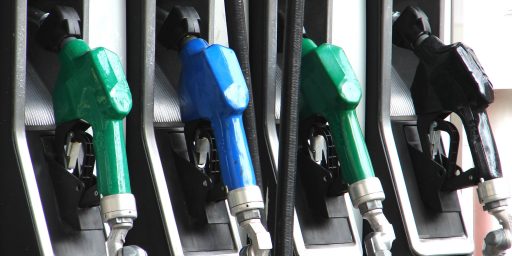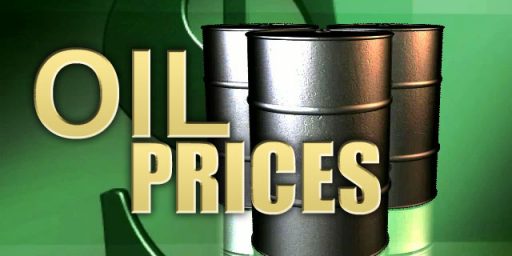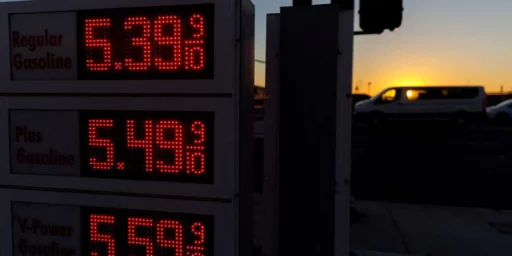Oil Prices Drop after Bush Move
Oil prices dropped somewhat yesterday after President Bush announced some policy shifts:
Crude oil and gasoline futures fell Tuesday after President Bush gave the Environmental Protection Agency the authority to relax regional clean-fuel standards to attract more imports of gasoline to the United States and to make it easier for supplies to be moved from one state to another. President Bush also said he would halt deposits of oil to the nation’s strategic petroleum reserve until the fall, but analysts said that measure would have next to no impact on crude prices and certainly would not help make gasoline any cheaper. Even the fuel-specification waivers will have a marginal impact, analysts said, given that the main force behind today’s soaring pump prices is the near-record price of crude oil.
So, governmental deregulation helps drop prices but attempts to artificially increase the supply doesn’t? Imagine that.
Still, the drop was modest and there are global factors that will keep prices higher than we have become accustomed to:
“If you have $75 a barrel crude oil, you’re sort of at a starting point of $2.90 a gallon for gasoline,” said Mary Novak, managing director at the economic consulting firm Global Insight. Light sweet crude for June delivery settled 45 cents lower at $72.88 a barrel on the New York Mercantile Exchange, dropping on the heels of a 4.48-cents-per-gallon decline in May gasoline futures, which finished at $2.1291 a gallon.
Analysts said a floor remains underneath oil prices, which are 33 percent higher than a year ago, for a variety of reasons:
– With daily global demand roughly 85 million barrels per day, the world’s oil producers have less than 2 million barrels per day of spare production capacity, and most of that is for Saudi blends of oil that are less ideal for manufacturing transportation fuels.
– Oil traders are nervous about geopolitical tensions ranging from violence in Nigeria to the West’s nuclear standoff with Iran to the move toward greater nationalization of natural resources in energy- rich Venezuela.
– The global economy is expanding, and that means the thirst for oil is only going to grow.
– Speculative investors are piling into energy markets as a way to profit from soaring prices and geopolitical turmoil that could potentially be bad for equities prices.
The article also notes that the internal politics of major oil producers Iran, Nigeria, and Venezuela could affect prices substantially. So, the ability of the White House to have more than marginal short term impact is minimal.






Shall we infer from this that reducing U. S. dependency on oil (practically speaking you can’t reduce U. S. dependency on foreign oil without reducing U. S. dependency on oil, generally) is less important than keeping the price of oil low? That in turn means that obnoxious regimes like the ones in Iran, Nigeria, and Venezuela will continue to disproportionately influence U. S. policy.
I genuinely wish that some U. S. president (any U. S. president) would start explaining this more clearly to the American people.
Deposed President Gore tried to do this and was called a wacko by the SCLM for his efforts.
There are more words in Roger’s comment after these, but who’s going to read them?
Thinking people, perhaps?
Dave: Bush has said that time and again, most recently in the very speech being quoted from yesterday. Realistically, however, not much is going to happen on that front overnight.
The problem is that gas has generally been very cheap. There have been periodic spikes–the early 1970s, late 1970s, late 1980s, and now–followed by a sharp fall. The one we’re in now will abate somewhat as refining capacity comes back online but appears to be largely permanent. Not because OPEC or someone is controlling the market but because of a global explosion in demand that is following prosperity in developing countries, notably China and India.
Cheap oil makes serious work in finding an alternative hard to justify economically and politically. Expensive oil, conversely, incentivizes R&D.
So, whatcha thinking about Roger?
Also, everyone tends to forget what the entire Bush family does when not running for election – THEY’RE IN THE OIL INDUSTRY. As a result, any noises made about reining in oil industry profits sound even less credible than most GOP talking points and strategic plans. It’s just another ‘shiny thing’ to make people think he’s actually going to do something to help Joe Sixpack.
“Mars, bitches!”
Actually, neither Bush 43 nor Bush 41 have been in the oil business for years. Decades in the latter’s case.
Oh gosh, since the culprits here are Venezuela, Nigeria, and Iran, I think the White House’s ability to have more than a marginal short term impact on oil prices is actually quite substantial, though the short term might get worse before it gets better.
‘Deposed President Gore’ ‘…and was called a wacko ‘
No doubt those two phrases fit together like peas in a pod.
If the Republicans have a future, they had best get the gasoline price to the $2.00 per gallon price or below.
No matter who or what is to blame, the Average working American feels the pain and will not stand for a “wage reduction” if the price does not drop immediately.
The average working person working for 10 to 12 dollars per hour see this gasoline price as a 20 % wage cut and will take their vengeance out at the polls.
Herb,
Who, exactly, are these people who are spending half their income on gasoline? The price has gone up, what, 50-75 cents since the last election? Aside from truck drivers, most people are being tagged with something like $15 a week.
I don’t agree people are angry about the higher prices but it’s completely irrational.
James:
I didn’t say 50%. I said the high cost of gasoline is equal to a 20 to 25% wage cut.
Rational or not, it makes no difference. People are going to take their feelings out on the people in power for not doing something about reducing prices.
And James, when Bush took power in 2000, We in the Midwest were paying 99.9 cents for a gallon of gasoline, so you can completely forget about the last election argument
Herb,
Gas going up a third in price isn’t a 20-25% wage cut unless you’re driving 100,000 miles a month or making $100 a week.
And the last election is what’s relevant. After all, Bush was elected in 2004 with the prices that existed then.
BTW, while I am now living in the DC suburbs, I was living in Alabama until 3 years ago and my parents still live there. People bitch about gas but unless they’re on welfare or in school, there just aren’t that many people who seriously can’t afford to drive when gas goes up a few cents.
I’ve got a 45-60 minute commute, each way, five days a week. Most people who live in the rural areas have a 10-15 minute commute. Regardless, almost none of us drive enough for gas prices to amount to a significant chunk of our pay.
James,
I live in a fairly rural western state. It’s about an hour’s drive from my house to work. fortunately, there’s a county-subsidized vanpool I & several people in my office take advantage of. It used to be free, but a year or so ago it went to $25 per month. It’s still an incredible bargain – without it I would be spending about $50 _every week_ just to get back & forth to work, with little alternative.
Frankly, Herb has it right on this topic – the President (and to a certain extent, his party) is _always_ shackled to the economy. If it’s good, he gets credit, if it’s bad he gets blamed. Whether you believe it’s appropriate or not, it’s what happens in public opinion. The Administration can trumpet economic figures all it wants, but the fact is the majority of Americans are _not_ seeing their bottom lines improve – they’re getting closer and closer to having to make very significant budgetary decisions, like moving to less-expensive houses and cars, etc. There’s some merit to the argument that maybe a lot of Americans have been ‘living on credit’ for far too long, that won’t make the pill any less bitter when it comes. And the Republicans are the ones who will be blamed.
Herb,
20-25% Wage cut?!?!?!
What are you talking about. Lets consider a person who makes $10/hour and works 40 hours a week. That works out to $400/week. If gas goes from $2.5/gallon to $3/gallon and they consume say 40 gallons that is $0.50 x 40 or about a $20 increase. That is only 5% of this guys (gross) salary/wage.
To get a 20 to 25% decrease the increase would have to be 4x or 5x as large. That is an increase of $2/gallon to $2.50/gallon.
Also, if we have a higher wage rate, then the implicit wage decrease is smaller.
Steve:
I f a guy makes $ 10.00 per hour and he has to spend 20 dollars to go to and from work every day, then I think that calculates to 2 hours of work per day or 20 dollars. That is 20%. Right, or do you use another system of math than I was taught in school.
You are forgetting that you live in California where everything is much much higher than the rest of the country.
Also forgot to mention before. I live in Corn country where the farmers are now getting ready to plow and plant their yearly corn crop. Their fuel costs are going to be much higher compared to 2000 when Bush took office (99.9 cts per gal then). What do you think is going to happen with the price of ethanol which is made from corn.
Herb,
What in the world are they driving that requires $20 of fuel each day? At $3 a gallon, that’s 6.67 gallons of fuel. Let’s say they’re driving a beat up Ford 150 getting 15 mpg. That’s 100 miles.
The number of people who simultaneously drive 50 miles each way to work, have a vehicle with poor fuel economy, and make such low wages they they can’t afford gas has to be pretty small.
Indeed, even at $2 a gallon, the guy in my above example was paying $13.34 daily, so we’re talking a dimunition of purchasing power of $6.66 daily due to the $1 increase. That’s still less than 9 percent of his gross income.
Legion and Herb,
I don’t disagree on the politics of this. Clearly, the incumbent president goes down in the polls when gas goes up. I’m merely arguing that it’s asinine.
Boycott Exxon Mobil
Either the guy lives way too far from work and moving could solve the problem, or he is driving a gas guzzling monster and a bicycle would solve the problem.
Steve: That’s a hell of a bike ride!
Not really, I was thinking a short distance but some sort of monster truck that gets like 1 mile to the gallon.
James:
I agree with you that it is asinine but, I learned something a long, long time ago about working people. That is.
You can do a lot to him and he will let it go by, but when you stick you hand in his pocket, there will be hell to pay.
Poling indicates that approx. 80 plus percent of the people think the oil companies are ripping them off and the Bush administration is doing nothing but lip service about it. Therefore, The Republican Party will pay the price.
Herb,
Which is precisely why politicians will do something, even something that could make the problem worse (e.g. Nixon and price controls). Bitch and moan all you want, there isn’t much that can be done.